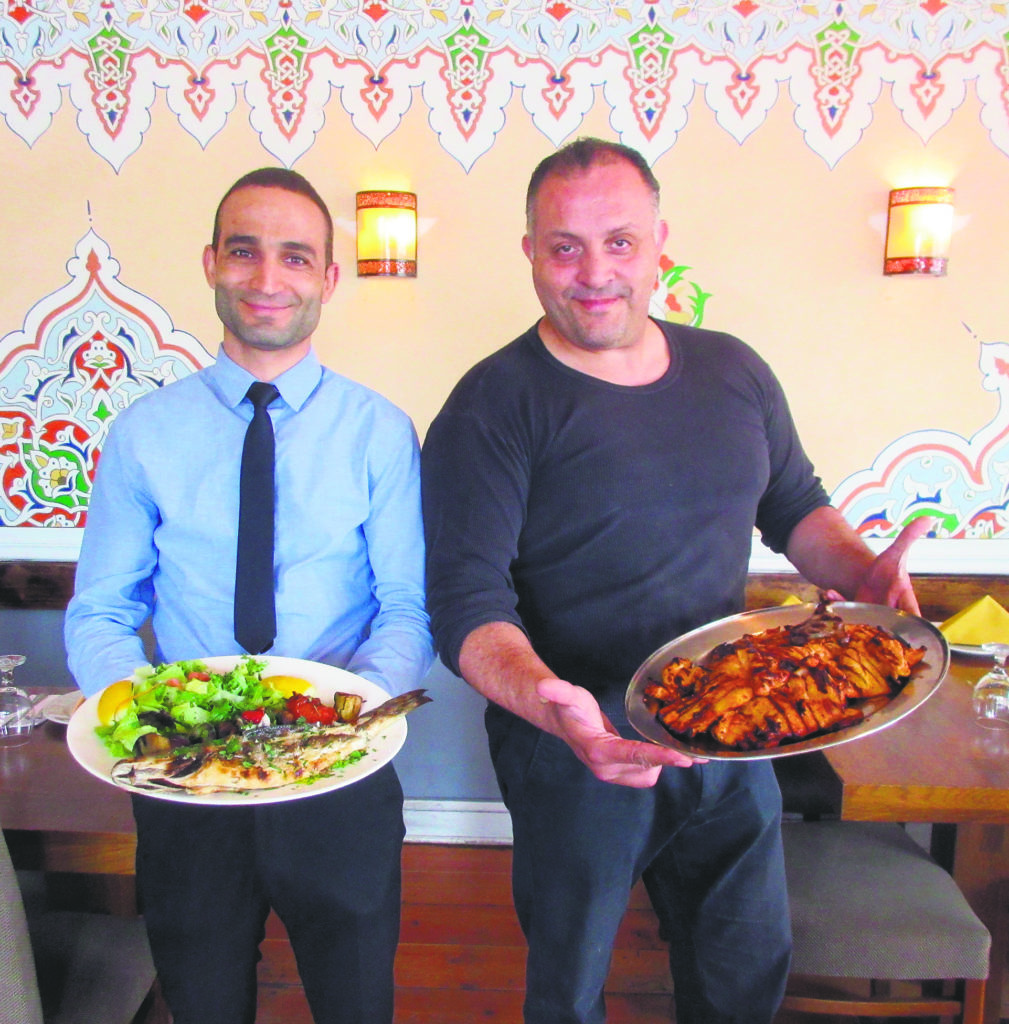I was delighted to learn that two of the people who work at Mediterranean Kebob House live in Westbury. Now I could write about Turkish food, one of my favorite cuisines, and about the restaurant that I’ve been frequenting since it opened 15 years ago.
Located on the corner of Maple and Post Avenues, Mediterranean Kebob House serves the kind of food that I grew up eating at my maternal grandmother’s house in Long Beach. She was from Yugoslavia and the cuisine was Mediterranean.

I was raised in New Jersey but there were frequent trips to grandma where I would eat her borekas (meat or cheese pies) and vinegary salad of tomatoes, onions, cucumbers and parsley. The Mediterranean Kebob House’s shepherd’s salad comes very close to this, although my grandmother’s version had lots more of the dressing, which I would drink after eating the vegetables. Once a year we would make the trek to Salisbury Park (now Eisenhower Park) for a Cousins Club picnic—most of the relatives lived in Long Beach so it was an easy trip for them. What I remember best was the huge piles of lamb slices that were threaded on skewers and grilled.
Saban Arslan, the co-manager of Mediterranean Kebob House who moved to Westbury in January of this year, agrees with me about the deliciousness of the food of his homeland. For him, meat reigns supreme. “In eastern Turkey they love meat—beef, lamb, goat.”
For his friend Cumali Kizil, who also lives in Westbury and is co-manager at the restaurant, Turkish food is all about the fish. Cumali has worked in various seaside regions throughout Turkey for 20 years and hopes some day to open a restaurant cooking fish Turkish style. He recommends grilling most fish, but is not a fan of adding lemon because it will change the taste of the fish. “Put your lemon in the salad,” he says. The fish he does recommend frying are mackerel, anchovies and red mullet.
The variety of Turkish cuisine is reflected in its geography and history. The country straddles both Europe and Asia and shares its borders with Bulgaria, Greece, Georgia, Armenia, Azerbaijan, Iran, Iraq and Syria. Its boundaries include three major bodies of water—the Black Sea to the north, the Aegean to the west and the Mediterranean to the south. The Silk Road, an ancient trade route running between China and Europe, was an important conduit of commerce and knowledge that also influenced the country and its cuisine.
Both Saban and Cumali start their day with a typical Turkish breakfast of olives, feta and kashkaval cheeses, tomatoes, cucumbers and eggs. “We cannot make breakfast without olives,” said Saban.
Another popular Turkish breakfast is menemen, a juicy spiced version of scrambled eggs with onions, red and green peppers, and tomatoes that is eaten with bread. Onion, garlic, Beyaz peynir and Turkish charcuterie products such as sucuk or pastırma may be added, although this strays from the traditional recipe. It is cooked with olive oil or sunflower oil. The dish is similar to shakshouka.
Menemen
Serves 4
3 large tomatoes
2 green peppers, chopped
1 onion, chopped
1 tablespoon butter
½ teaspoon sea salt
¼ teaspoon chili flakes
4 eggs, beaten
1. Peel tomatoes by scoring them with a sharp knife and blanching in boiling water for one minute. Take out and leave to cool. The skin should then peel off without effort. Chop flesh finely, discarding seeds.
2. Saute peppers and onion until soft. Add chopped tomatoes and cover pan, simmering until they have softened into pulp. Remove lid and continue to heat until liquid is reduced. Add salt and chili.
3. Stir in beaten eggs. Once eggs start to solidify, serve with bread and Turkish tea.

























